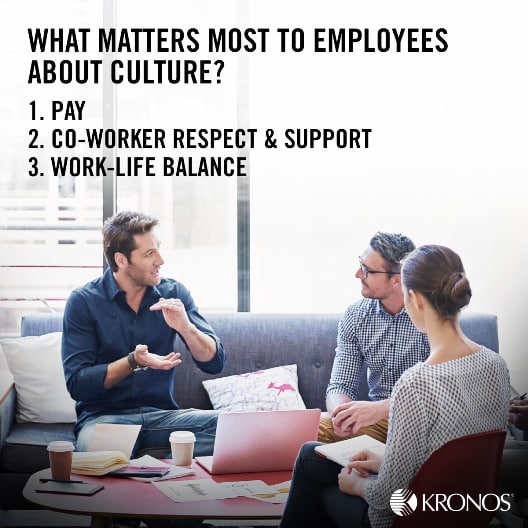(Editor’s Note: Today’s post is brought to you by our friends at Kronos, the global leader in delivering workforce management solutions in the cloud. To learn more about designing and managing a company culture that drives bottom line success, check out fellow board member and Kronos Chief People Officer David Almeda’s chapter in The Workforce Institute’s latest anthology, It’s All About Bob(bie): Strategies for Winning with Your Employees. Enjoy the post!)
Company culture refers to the shared values, attitudes and beliefs that characterize an organization. It’s a part of the company’s goals, structure, and philosophies about employees and customers. Culture is important.
But do you know who’s accountable for your organization’s culture? According to the new study released by The Workforce Institute at Kronos, opinions differ greatly on company culture: who defines it, what drives it, and how can you change it.
The study is called “Who’s the Boss of Workplace Culture?” and responses were segmented by three groups: 1) human resources professionals, 2) people managers, and 3) non-management employees.
Employees define company culture
There are many different points of view when it comes to who defines organizational culture.
- Forty percent (40%) of Millennial employees said that employees define culture.
- Thirty-three percent (33%) of HR pros said they define culture, with only 10 percent of managers and 3 percent of employees agreeing.
- Twenty-six percent (26%) of managers said the executive team defines culture, while only 11 percent of HR pros and 9 percent of employees felt the same.
- Twenty-eight percent (28%) of employees said “no one” defines culture.
I think it’s safe to say that everyone plays a part defining company culture. That’s a good thing. But it also means that organizations have to create “communities” that give each individual a chance to contribute. Employees who do not feel they are a part of the company culture are sure to disengage from it.
What makes a culture?
In the study, employees responded that 1) compensation, 2) respect, and 3) work life balance are the keys to an attractive company culture. Interestingly, only 25 percent of HR pros and 29 percent of managers thought compensation would be in the top three of how employees view culture. A disconnect clearly exits.
However, when asked what kills a culture, HR pros and managers acknowledged “a high stress work environment” was a major concern. A sign that all groups recognize the impact that the work environment can have on culture and the importance of balance at work and home.
Interestingly, groups were also on the same page regarding strategies to strengthening culture. HR pros and managers identified “training and development” as a top strategy (72 percent and 61 percent respectfully.)
Organizations recognize that employee well-being is a key component in healthy company cultures. Well-being efforts support an employee’s career goals, relationships, financial literacy, physical health and community pride. They encourage employees to bring their “whole selves” to work.
Technology is changing culture
Social media and online review sites are changing the culture conversation according to 43 percent of HR pros and 39 percent of managers. Candidates are researching organizations before they choose to apply for jobs. This ultimately has an impact on the talent coming into the organization.
Whether it’s in person or via technology platforms, feedback is the number one ingredient to maintaining a healthy and relevant culture according to 50 percent of HR pros and 41 percent of managers. Organizations should create internal mechanisms that encourage peer-to-peer feedback, informal learning, and recognition as a strategy for building and maintaining a positive workplace culture.
Culture drives business results
Organizational differences about who owns culture is a significant finding. If organizations aren’t on the same page about who owns culture, then how can they maintain it? We do need people to maintain organizational culture. It’s drives our marketing and employment branding, customer and candidate experiences, and much more.
[clickToTweet tweet=”What is company culture and who owns it? The answers may surprise you.” quote=”What is company culture and who owns it? The answers may surprise you.” theme=”style3″]
More importantly, as fast as the business world is changing, what if we need to tweak our culture? We need to be able to enhance the components of our culture without sacrificing what made the company great.
This is a very interesting question to discuss with senior management and employees. Is everyone on the same page where company culture is concerned? And what are the consequences if they’re not?








Seun Akande says
I think, the executives are very important in the culture of an Organization. They drive it down to the lowest staff and also formulate good policy and process to achive it